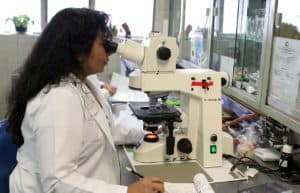Is This a Good College for Pre-Med? Three Ways to Know with CIT Consultant Tiffany Eggers
Written by CIT Consultant Tiffany Eggers
 Aspiring doctors face a long and challenging journey, and choosing the right college is a crucial early step. You want an undergraduate college that will not only equip you with the academic foundation for the rigors of medical school but also confirm and fuel your desire to help others as a physician.
Aspiring doctors face a long and challenging journey, and choosing the right college is a crucial early step. You want an undergraduate college that will not only equip you with the academic foundation for the rigors of medical school but also confirm and fuel your desire to help others as a physician.
There is no major called “Pre-Med.” When undergraduates call themselves pre-med, they mean that they plan to apply to medical school. In preparation, pre-med students take a series of prerequisite courses.
A good pre-med program assists you in becoming a competitive applicant. Even for hardworking, intelligent students, getting into medical school isn’t easy. According to the Association of American Medical Colleges (AAMC), 40% of applicants were accepted to a medical school for the 2023-24 school year. (This is after applying to, on average, 18 schools.) So, how do you tell if a college is the pre-med paradise and acceptance opportunity booster you’re searching for? Let’s explore three key factors to consider:
First Factor: Academic Strength and Resources
 Coursework and Requirements/GPA: Does the college offer the rigorous prerequisite courses most medical schools demand? These courses generally include:
Coursework and Requirements/GPA: Does the college offer the rigorous prerequisite courses most medical schools demand? These courses generally include:
-
- Biology with labs (2 semesters)
- Chemistry, both organic and inorganic, with labs (2-4 semesters)
- Physics with labs (2 semesters)
- English (2 semesters)
- Mathematics–Statistics and sometimes Calculus (2-4 semesters)
- Genetics (at least one course)
- Psychology (at least one course)
- Sociology (at least one course)
A student’s GPA in this coursework significantly influences medical school acceptance. The average GPA for successful medical school applicants in 2023 was typically between 3.6 and 3.8 on a 4.0 scale, according to the AAMC.
Students need to know that admissions offices typically do not adjust GPAs based on the specific pre-med program. This means that an A from a less competitive program will have a similar weight to an A from a highly competitive program.
Pick a program where you think you will succeed rather than a program you believe is most prestigious. While it’s impressive to go to Harvard or Stanford, it won’t help you get into medical school if your GPA is low because the classes are too challenging or your classmates are too competitive for you. Choose a school with a good reputation and a manageable level of rigor.
Medical College Admissions Test (MCAT) preparation resources and opportunities: The MCAT is a 7.5-hour test required for admission to medical school. It consists of four sections, with an overall score of 472-578. Experts recommend aiming for a 509 or higher, placing you around the 80th percentile of MCAT scores. While it is true that students typically don’t take their MCAT prep courses at the college they attend, many colleges offer excellent resources that help students prep for the difficult test. Some colleges provide review materials, while others aid in forming study groups.
Completing pre-med required courses is necessary to prepare you for the MCAT. Majors like chemistry, biochemistry, physics, and biology can expose you to more technical MCAT-relevant content. However, you are not required to select a science- or health-related major for admittance to medical school.
 Class Size and Faculty: Consider class sizes and professor accessibility. Do the instructors seem invested in your success? Smaller class sizes can facilitate individualized interactions between students and instructors. Professors are expected to focus on each student’s unique needs at some schools, offering guidance, mentorship, and tailored feedback. Sit in on a class or two if possible. Do classmates and professors engage with each other before and after class, fostering meaningful relationships and building strong networks?
Class Size and Faculty: Consider class sizes and professor accessibility. Do the instructors seem invested in your success? Smaller class sizes can facilitate individualized interactions between students and instructors. Professors are expected to focus on each student’s unique needs at some schools, offering guidance, mentorship, and tailored feedback. Sit in on a class or two if possible. Do classmates and professors engage with each other before and after class, fostering meaningful relationships and building strong networks?
Research Opportunities: Early research experience with possible publication strengthens your resume and skills. Does the college offer research opportunities with faculty or nearby institutions? Some schools emphasize undergraduate participation in research. More prominent Universities may reserve most of their research slots for their graduate students, while others have more than enough laboratory spots for anyone who would like to work. Even though a school is smaller with fewer large research grants, students may have more opportunities to garner a spot on the lab bench. When you tour a school, in person or virtually, ask what standard practice is.
Second Factor: Pre-Med Support and Mentorship
Dedicated Pre-Med Advising: Does the college have a pre-med advising office with experienced advisors who can guide you through course selection, MCAT preparation, medical school applications, and interviews? Pre-med advisors can help students develop a plan to get where they want to go, including selecting the most valuable academic courses, research experiences, and extracurricular activities.
Peer Support Network: Are there pre-med clubs or societies where you can connect with like-minded peers, share experiences, and learn from each other? Many schools advise and support specific Pre-Professional health-related organizations. Some clubs foster discussion of current medical ethics issues and changing healthcare policies. Others host guest speakers (especially doctors or admissions people), provide free clinics to local community members, or offer reduced fees on MCAT materials.
 Shadowing and Clinical Exposure: Students should demonstrate a commitment to the kinds of activities that would translate to a career in health care. Medical schools prefer students who know why they want to be doctors and have had opportunities to confirm it. Students with hands-on patient care, in-depth health-related volunteerism, or physician shadowing are more likely to gain acceptance to medical school. Look for colleges with programs or partnerships that offer shadowing opportunities with doctors or clinical volunteer experiences to gain valuable first-hand exposure to the healthcare field. Many colleges have offices that connect students with community service and leadership.
Shadowing and Clinical Exposure: Students should demonstrate a commitment to the kinds of activities that would translate to a career in health care. Medical schools prefer students who know why they want to be doctors and have had opportunities to confirm it. Students with hands-on patient care, in-depth health-related volunteerism, or physician shadowing are more likely to gain acceptance to medical school. Look for colleges with programs or partnerships that offer shadowing opportunities with doctors or clinical volunteer experiences to gain valuable first-hand exposure to the healthcare field. Many colleges have offices that connect students with community service and leadership.
Third Factor: Beyond the Academics
Location and Cost: Consider the cost of attendance and whether the college’s location provides access to medical schools, research facilities, or volunteer opportunities. If you select a college not close to several hospitals, you might have to spend a great deal of time and money to get relevant experience.
School Culture and Fit: Does the college’s atmosphere and student body resonate with your personality and learning style? Will you feel supported and thrive in that environment? A happy student who feels comfortable will have higher grades and participate in various activities. How flexible is the school to meet the student’s individual needs? Is moving around a clerkship or other professional endeavors a Herculean effort, or will the administration put forward the effort to make things work for you?
Balance and Well-being: Remember, medical school is a long road. Choose a college that prioritizes student well-being and offers resources for mental health support. How burdened are student counseling and support services? If something happens, must you wait a month to see someone? Your college should help you learn to manage stress even before medical school. This is a life skill that physicians need to have.
Choosing the right college for pre-med is a personal decision. Carefully consider the above factors, research individual schools, and don’t fall into the trap of selecting a school predominately for its prestige. Remember, it’s not just about academics; it’s about finding a place that will nurture your passion and prepare you for the journey ahead.
 Bonus Tip: Be careful if you attempt to research the success rate of any college’s pre-med graduates in gaining admission to medical schools. There is not one solid, reliable source for this information. The statistics published by undergraduate schools are often not calculated similarly, rendering comparisons meaningless or misleading.
Bonus Tip: Be careful if you attempt to research the success rate of any college’s pre-med graduates in gaining admission to medical schools. There is not one solid, reliable source for this information. The statistics published by undergraduate schools are often not calculated similarly, rendering comparisons meaningless or misleading.
It is typically impossible to know the average GPA/MCATs of the applicants or other essential factors. Some schools only report allopathic school (MD) acceptances, while others report allopathic and osteopathic (DO) acceptances. Some schools will report statistics of students supported with a committee letter (an essential factor), while others report the acceptance rate of all students, with or without a committee letter. Some colleges discourage all but the most promising candidates from applying to medical school. This practice would affect a school’s statistics because only the college’s strongest candidates would apply and be very likely to get in, artificially boosting the overall acceptance rate.
